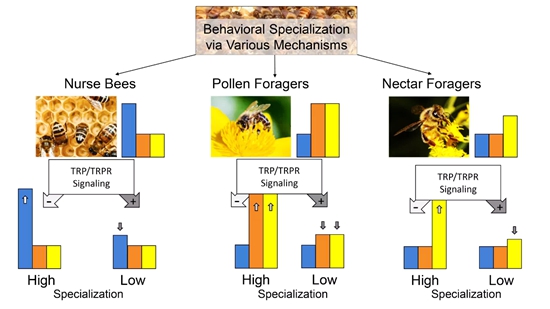Tachykinin signaling regulates task-specific behavioral responsiveness in honeybee workers
Recently, the honeybee proteomics innovation research team of the Institute of Apicultural Research has demonstrated the tachykinin signaling inhibits the degree of task-specific responsiveness of specialized honeybee workers and may control the context specificity of behavior in animals more generally. This paper has been published online in eLife.
In social insects, individual variation in response thresholds is linked to division of labor, and numerous studies have characterized this link across multiple levels of biological organization. The Western honeybee (Apis mellifera) is the most-studied social insect model. Many aspects of its division of labor are driven by a lifelong behavioral ontogeny, leading to age polyethism. Young bees perform numerous inside tasks, most prominently brood care in form of alloparental nursing behavior, before transitioning to a mix of other in-hive tasks. Similar to the highly specialized nursing stage, foragers often specialize on collecting only one of the principal food sources, pollen or nectar. Specialized nurse bees, nectar foragers, and pollen foragers are also found in the closely related Eastern honeybee (Apis cerana).
In this study, the research team showed that response thresholds to task-relevant stimuli correspond to the specialization of three behavioral phenotypes of honeybee workers in both Apis mellifera and Apis cerana. Quantitative neuropeptidome comparisons suggested two tachykinin-related peptides (TRP2 and TRP3) as candidates for the modification of these response thresholds. Based on characterization of their receptor binding and downstream signaling, they confirmed a functional role of tachykinin signaling in regulating specific responsiveness of honeybee workers: TRP2 injection and RNAi-mediated downregulation cause consistent, opposite effects on responsiveness to task-specific stimuli of each behaviorally specialized phenotype but not to stimuli that are unrelated to their tasks.
This work was supported by the National Natural Science Foundation of China (No. 31970428), the Agricultural Science and Technology Innovation Program (CAAS-ASTIP-2015-IAR), and the earmarked fund for Modern Agro-Industry Technology Research System (CARS-45) in China.
More information can be found through the link:
https://elifesciences.org/articles/64830

Conceptual model representation the TRP signaling effect
By Han Bin (hanbin@caas.cn)
-
 Apr 18, 2024Opening Ceremony of the Training Workshop on Wheat Head Scab Resistance Breeding and Pest Control in Africa Held in CAAS
Apr 18, 2024Opening Ceremony of the Training Workshop on Wheat Head Scab Resistance Breeding and Pest Control in Africa Held in CAAS -
 Apr 03, 2024IPPCAAS Co-organized the Training Workshop on Management and Application of Biopesticides in Nepal
Apr 03, 2024IPPCAAS Co-organized the Training Workshop on Management and Application of Biopesticides in Nepal -
 Mar 28, 2024Delegation from the School of Agriculture and Food Science of University College Dublin, Ireland Visit to IAS, CAAS
Mar 28, 2024Delegation from the School of Agriculture and Food Science of University College Dublin, Ireland Visit to IAS, CAAS -
 Mar 25, 2024Director of World Food Prize Foundation visited GSCAAS
Mar 25, 2024Director of World Food Prize Foundation visited GSCAAS -
 Mar 20, 2024Institute of Crop Sciences (ICS) and Syngenta Group Global Seeds Advance Collaborative Research in the Seed Industry
Mar 20, 2024Institute of Crop Sciences (ICS) and Syngenta Group Global Seeds Advance Collaborative Research in the Seed Industry
